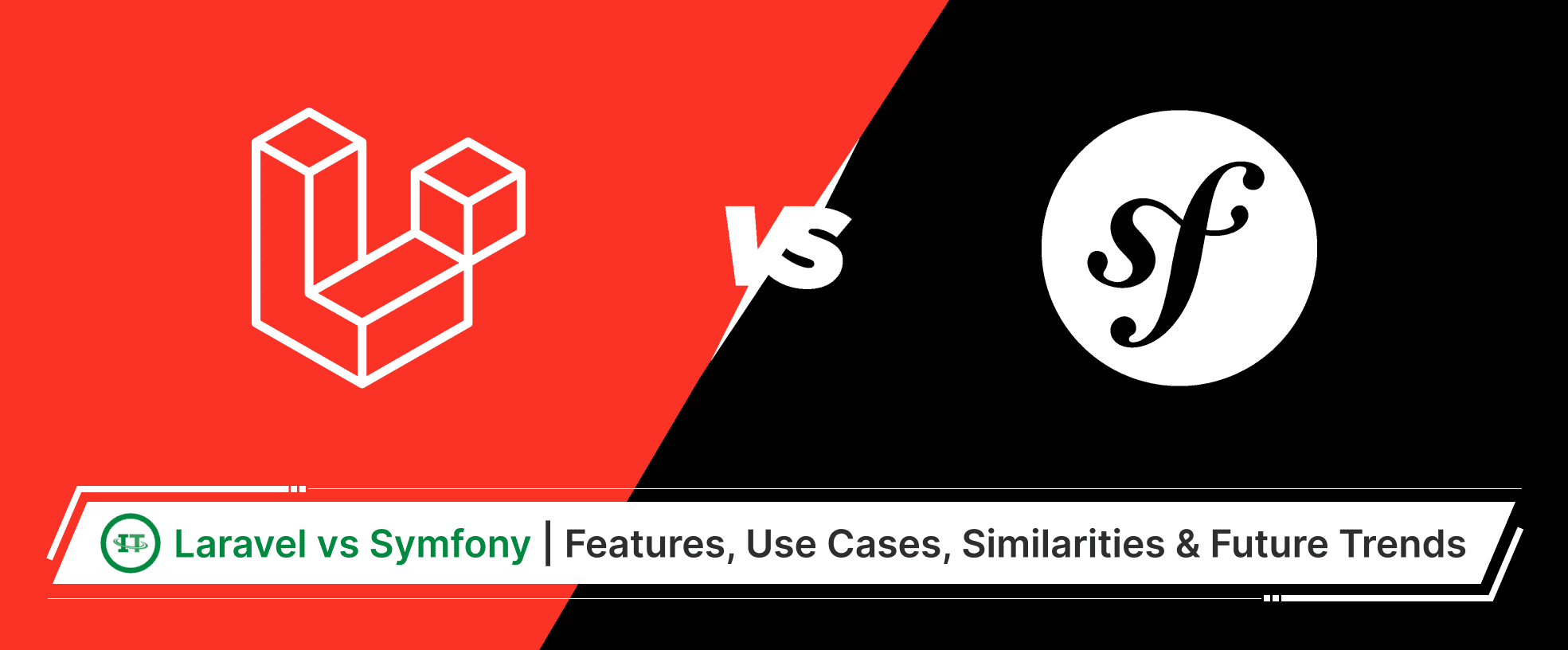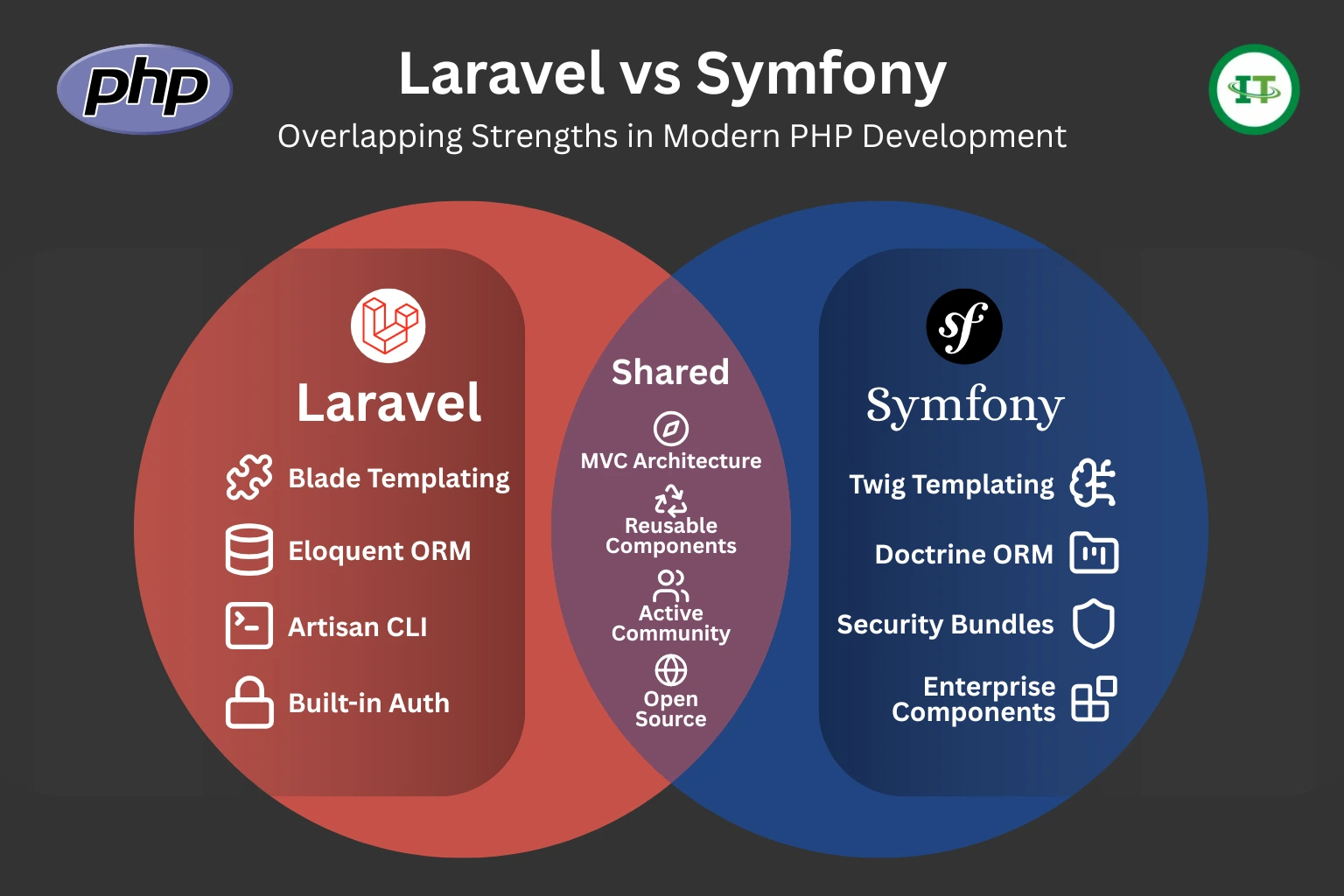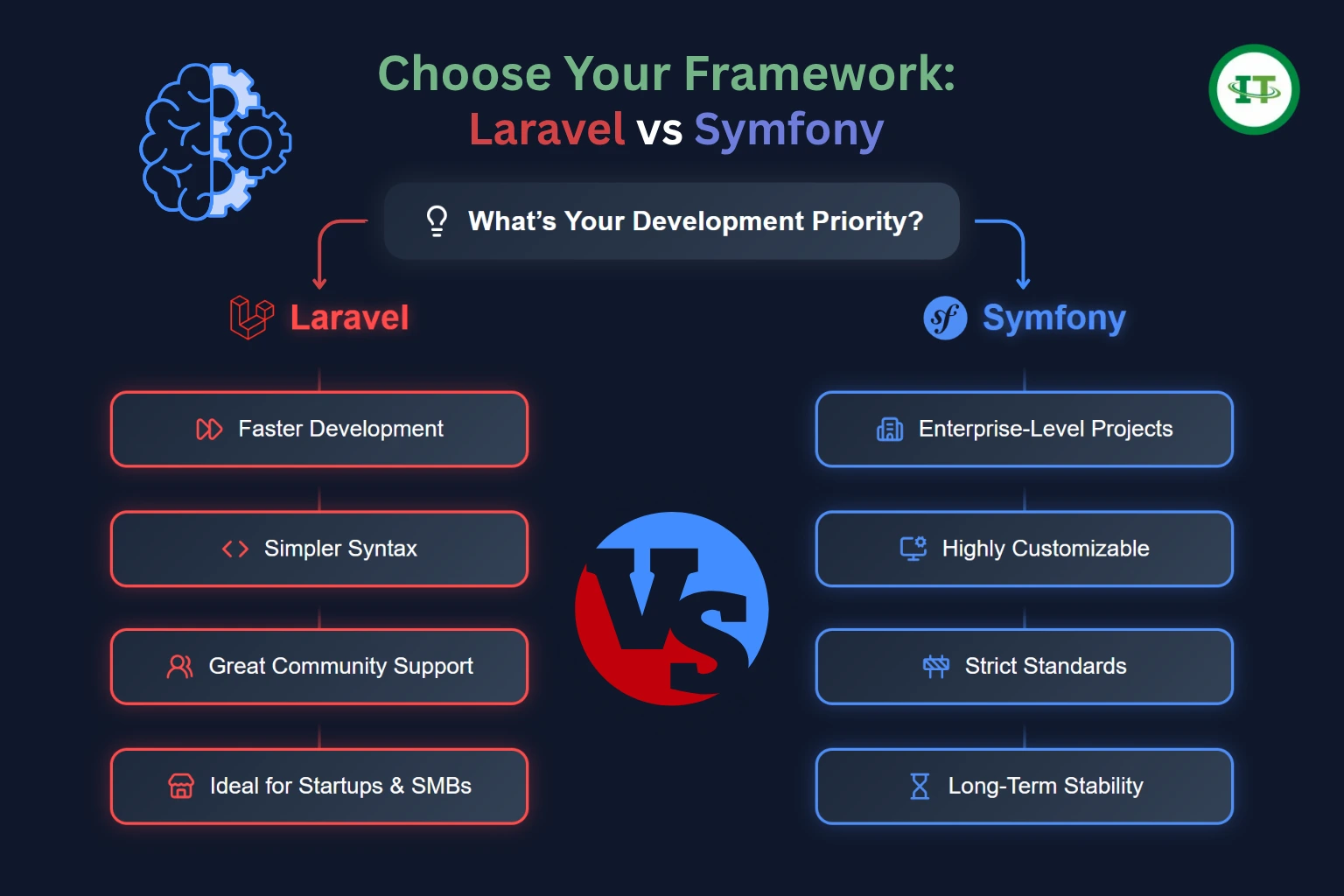Laravel vs Symfony: Which Framework Is Better?

Laravel builds fast, Symfony builds strong. Creativity is in your hands.
Picking the right PHP framework for your next project, whether it’s Laravel or Symfony, can feel like a tough decision. In 2025, Laravel vs Symfony debate is unstoppable and going strong as these two extensive PHP solutions are continuously evolving to dominate the web development framework. Both evolved impressively with PHP 8.4 offering cleaner syntax, scalability, and satisfying the growing demands of the developers.
What Will We Cover?
- What is Laravel?
- What Are The Key Features of Laravel?
- Laravel Use Cases: From Startups to Mid-Scale Apps
- What is Symfony?
- What Are The Key Features of Symfony?
- Symfony Use Cases: Powering High-Traffic Platforms
- What Are The Similarities Between Laravel vs Symfony?
- Laravel vs Symfony: A Detailed Comparison Between Both
- So, Which One Should You Choose: Laravel vs Symfony?
- Laravel vs Symfony: Future Trends in The PHP Landscape
Before we understand the key differences between Laravel vs Symfony, let’s get a glance at what makes both of them unique and shine in their own way!
What makes Laravel shine?
- Elegant syntax
- Artisan CLI and Eloquent ORM
- Fast development for MVPs and startups
- React, Vue, and Tailwind CSS via Laravel Mix or Jetstream
- Active community
What makes Symfony shine?
- Modular architecture
- Excellent enterprise solutions
- Twig templating engine
- Testing and debugging
- Long-Term Support
Let’s see the rivalry features of Laravel vs Symfony and why choose Laravel for your web development in this blog.
What is Laravel?
Laravel is a free, open-source PHP framework that makes web development faster and easier with its elegant syntax and built-in tools. Are you thinking about building a full-featured app in a few hours? That’s the magic of Laravel in 2025. Laravel’s features engage developers by allowing them to spend more time on creativity.
The launch of Laravel 12 takes web development to a giant leap with its updated starter kits. The elegant syntax of Laravel breaks down complex code writing for developers and greatly improves productivity. The impressive integration with Laravel Cloud enhances smooth deployment and improved scalability. When it comes to Laravel vs Symfony features, Laravel leads the way by 60ms average load time.
What Are The Key Features of Laravel?
If you are curious about the latest Laravel 12 release in February 2025, it’s fully compatible with PHP 8.4, offering greater speed, flexibility, and efficiency. These efficient updates make fast and secure modern web development frameworks. Here are some key features that focus on developer productivity and building small to complex applications.
| Feature | Description | 2025 Update | Developer Benefit |
|---|---|---|---|
| PHP 8.4 | The latest PHP version ensures compatibility | Better type safety and performance | Boost workflow efficiency and long-term stability |
| Process Facade | Ease the execution of system commands and background tasks | Improved command execution and output handling | Saves time with smoother automation |
| Authentication | Secure authentication with Breeze and Jetstream | Multi-factor & session updates | Better app security |
| Queues, Task scheduling | Handles background tasks and smoother app performance | Faster job execution | Quicker app response |
| Error handling | Smarter logging and debugging | Clear error reporting | Improved fixes, less downtime |
| Blade templating | Offers clean, reusable templates for server-side rendering | Integrates with React or Vue using Laravel Mix or Inertia.js | Better modern UI creation |
| API tools | Ease RESTful API development | Better sanctum handling | Quick and safe API builds |
| Ecosystem tools | Forge, Vapor & Nova for scaling | Cloud integration | Faster deployment and management |
Laravel Use Cases: From Startups to Mid-Scale Apps
Laravel ultimately shines in faster MVPs, SaaS platforms, or e-commerce stores. Its next-level built-in tools perform at their fullest for startups and mid-scale apps, focusing on elevating their businesses. The Laravel ecosystem advantages enable development teams to turn from idea to action quickly through tools like Forge, Vapor, Nova, and Horizon.
If you are comparing Symfony vs Laravel use cases, without second thought, Laravel wins the battle for the project that requires speed, scalability, and developer-friendly workflows.
Now, let’s look into some real-world use cases:
- Invoice Ninja – Versatile invoice app
- Bagisto – E-commerce platform
- Canvas – Elegant blog platform
- Flarum – Forum software
- OctoberCMS – Content management solution

What is Symfony?
The latest Symfony 7.3 launched in 2025 offers customized app building with its reusable components. It is ideal for high traffic platforms, thus the recent updates with modular packages focuses on stability, better productivity and long-term support.
Do you know why Symfony is ideal for handling complex projects? In PHP framework comparison, Symfony shines out for enterprise-level projects that require robust output and flexibility. Let’s compare and see Symfony vs. Laravel how Symfony wins the battle with its key features, which are built to handle complex projects.
What Are The Key Features of Symfony?
Though Laravel vs Symfony features rival with each other, the Symfony 7.3 release pinpointed the major fixes. Symfony in 2025 spotlights its functions with enhanced stability, high-end performance, and security. Thus, Symfony has become a trustworthy web development framework for complex and scalable projects. The key features include:
Twig templating
A latest templating tool optimised for clean coding, and sets the front-end layout simply. It divides logic from presentation and enhances UI handling more easily with high security.
Doctrine ORM
An efficient tool replaces repetitive SQL queries by handling data and relationships in the background. Doctrine seamlessly handles database functions by linking PHP objects to database tables, making complex SQL queries much easier to handle.
Event Dispatcher
Developers can handle tasks like notifications or logging activity without connecting parts of the app too closely. It boosts apps to respond to events with a dynamic approach.
Routing Component
It helps in managing complex web apps in a clean and organized way. Symfony’s routing feature effectively maps website URLs to controllers and can handle dynamic links easily. This supports improved SEO and predictable URL handling.
Security Module
It allows only authorized users to access sensitive data via role-based permissions, password encryption, and multiple-layer verification.
Symfony Use Cases: Powering High-Traffic Platforms
Symfony is an expert in smooth performance even under high traffic. One step above, the modular architecture, reusable components, and high-end performance shape it for complex projects.
Look into some real-world examples:
- Spotify – Symfony handles numerous music streaming
- Vogue – Symfony manages high-volume publications
- BlaBlaCar – Symfony offers scalable ride-sharing services for a large number of users.
| Component | Function | 2025 Patch Impact | Use Case |
|---|---|---|---|
| Twig templating | Front-end templates | Better performance and security | Clean, reusable UI layouts |
| Doctrine ORM | Database management | Debugging, optimized queries | Improved data management |
| Event Dispatcher | Manage application events | Enhanced stability and flexibility | Manage notifications, logging, and decoupled tasks |
| Routing | Linking URLs to controllers | Improved dynamic parameter support | Better URL management |
| Security | Authentication, access control | Strong authentication and permissions | Encrypted sensitive data |
Do you know about the similarities between Laravel vs Symfony? Let us explain.
What Are The Similarities Between Laravel vs Symfony?
We can see similar features between Laravel and Symfony. When looking into depth, both are PHP based frameworks launched to ease the web apps development. Both the web development frameworks are open-source and allow collaboration and shared ideas from developers across the world.
When talking about the comparison of PHP frameworks, the following features share the similarities in modern and innovative web development:
| Aspect | Laravel Approach | Symfony Approach | Shared Benefit |
|---|---|---|---|
| Architecture (MVC) | MVC for clean and organized code | MVC for structure | Keeps applications clean and easy to handle, and adaptable to growth |
| Security | Built-in auth and CSRF security | Improved authentication and security bundles | Provide security from vulnerabilities, protects sensitive data |
| Templating | Simple Blade templating | Flexible Twig templating | Creates clean and reusable UIs |
| Database (ORM) | Eloquent for data management | Doctrine for improved mapping | Enhance quicker and simpler database workflow, simplify database interactions and replace complex SQL code |
| Routing | Elegant and expressive syntax | Flexible routing system | Better URL management, managed separately by distinct routing components |
| Community support | Active global community | Enterprise-level open source community | Enhancing long-term support, regular updates, and innovation |
| Extensibility | Reusable components for adding or customizing features | Reusable components for adding or customizing features | Enhanced flexibility for developers |
Are you excited to know about both PHP frameworks comparison in detail? Here we’ve provided an in-depth overview:
Laravel vs Symfony: A Detailed Comparison Between Both
While discussing Laravel vs Symfony features, we found that both share many similarities, but each excels in different ways in modern web development. Understanding the comparison between both the PHP frameworks and their key features will let you know which one stands out in 2025.
1. Performance and Scalability Breakdown
When looking into performance and scalability in the Laravel benchmark in 2025, it points out that Laravel is ideal for standard web applications. Its loading time is around 60ms through lightweight routing, smart caching, and improved request handling. That’s why Laravel is a perfect match for startups, MPVs, and mid-sized projects.
Symfony is modular and scalable for heavy-traffic project requirements. Comparatively, its load time is around 250ms longer than Laravel’s, but its modular structure and reusable components support developers in managing complex workflows.
When evaluating features of Laravel vs Symfony, Laravel is ideal for projects which require speed and rapid app response. While Symfony is ideal for high-scale and complex web app projects.
2. Popularity, Community, and Learning Curve
The widespread Laravel learning curve fueled its popularity and gained significant recognition among developers. According to the Trends, 640,597 [1] live websites use Laravel. The exclusive Laravel ecosystem advantages and active community support enable developers to build customized modern web apps quickly.
Symfony requires more time and effort to learn, but its flexibility and depth make it a go-to choice for developers. Though Symfony’s community is small and about 10,533 [2] of websites adopted this framework which excels in enterprise-level projects. It offers highly advanced security bundles and enterprise-level support, which is why Symfony takes the chance on complex Symfony vs. Laravel use cases.
Laravel gives it a shot for simple workflow, popularity and quick adoption. On the other hand Symfony shines out for enterprise-level complex projects.
3. Security, Testing, and Ecosystem Face-Off
Laravel is considered as a developer-friendly framework due its built-in features. The built-in security set ups elevate authentication scaffolding, CSRF protection, password encryption and enhance developers to quickly secure the apps.
Symfony offers configurable security set up allowing developers distinct control over authentication, authorization, and access management. Developers can build customized protection with a security bundle and guard component.
Laravel and Symfony both have a significant position in modern web development frameworks. Laravel draws attention with its built-in authentication and testing tools and is the best choice for projects that seek a faster move. Symfony is a top pick for customizable protection for enterprise-level security and complex projects.
| Factor | Laravel | Symfony | Winner in 2026 |
|---|---|---|---|
| Performance | Quicker average load times | Better scalability for complex apps | Laravel for small/mid-scale projects, Symfony for large/complex projects |
| Learning Curve | Smooth and beginner-friendly | Difficult and fit for professionals | Laravel for beginners |
| Community support | Active global community | Smaller but highly specialized | Laravel for general devs, Symfony for enterprise |
| Security | Built-in authentication, CSRF protection | Configurable and security bundles for enterprise-grade | Based on project complexity |
| Ecosystem and Tools | Artisan CLI, Laravel Cloud, and Horizon | Reusable components, enterprise tools | Laravel for developer-friendly tools, Symfony for enterprise tools |
| Use Cases | Startups, MVPs, mid-scale projects | High-traffic, enterprise systems | Laravel for startups/MVPs, Symfony for enterprise/high-traffic systems |
Now it’s time to decide which web development frameworks fit your project.
So, Which One Should You Choose: Laravel vs Symfony?
The right choice depends on your project requirements. In 2026, Laravel and Symfony remain the leading web development frameworks. If you are just stepping into the PHP frameworks, then Laravel is the best fit for you. Meanwhile, Symfony is a powerhouse built for scalability, flexibility, and long-term enterprise and complex projects.
Here are the factors you have to consider while choosing Laravel vs Symfony frameworks:
- Project size and complexity
- Team experience and learning curve
- Timeline and budget
- Customization requirements
- Maintenance and scalability

Is Laravel Better for Beginners?
Certainly, if you are a beginner in the web development world, Laravel is the ideal choice for you. With an efficient Laravel learning curve, intuitive design and productive Laravel ecosystem advantages enhance development smooth and enjoyable.
Let’s break down the future trends of both web development frameworks.
Laravel vs Symfony: Future Trends in The PHP Landscape
When looking forward, the PHP framework comparison is not only about Symfony vs Laravel features, it’s about innovative and productive integration. The inclusion of serverless computing, AI integration, and API-first development will evolve in the future of modern web development evolution.
| Trend | Laravel Impact | Symfony Impact |
|---|---|---|
| AI-powered development | Integrated AI tools for code suggestions, debugging, and automation | Integrate AI for performance tuning and more innovative dependency management |
| Serverless Architecture | Seamless serverless deployments using Laravel Vapor (AWS, google cloud and azure) | Flexible integration and cloud native environments |
| API-First development | Faster RESTful and GraphQL API creation | Enhancing API platform support for complex, large-scale API systems. |
| Performance Optimization | Better speed with lighter middleware and caching | Improved stability under heavy traffic |
| DevOps and Automation | Expanding CI/CD, Docker, and Laravel Forge integration | Enhanced testing and deployment automation |
| Sustainability and Efficiency | Upgrade, clean, and optimize code | Builds efficiency through modular, reusable components |
Concluding The Comparison
From the above Laravel vs Symfony comparison, we can see that both the web development frameworks excel in their own way. However the right choice depends on your goal, team experience and project scale.
Even though Laravel vs Symfony features share some key similarities, they continuously thrive to upgrade their best to fit with developers expectations. With AI integration both will provide robust features and uplift the web development frameworks to the next level.
To make the right choice, just give a try to both frameworks with simple projects and understand their workflows then decide which suits your requirement.
TLDR – Key Takeaways:
- Laravel is best suited for beginners, fast, and ideal for start-ups
- Symfony excels with enterprise-level projects with long-term maintainability.
- Loading time for Laravel is about 60ms, and for Symfony is about 250ms.
- Laravel provides built-in tools for security and testing, while Symfony offers configurable, enterprise-level security.
- Both frameworks focus on AI integration in the future to elevate the web development world.
Frequently Asked Questions (FAQs)
Still have questions in mind? Let us clarify it for you in detail.
1. Which framework is better, Laravel or Symfony?
The better choice absolutely depends upon your goals. As both Laravel and Symfony excel in different features, Laravel excels with beginners, startups and fast moving apps while Symfony shines in enterprise-grade projects.
2. What is the current Laravel vs Symfony popularity?
As of 2025, Laravel leads in popularity in about 640,597 [1] websites using it ensuring its rapid development and robust ecosystem over Symfony and about 10,533 [2] websites adopted Symfony framework which excels in enterprise-level projects.
3. Can Laravel & Symfony be used together?
Definitely, Laravel offers several key Symfony components such as Routing and HTTP kernel and enhancing developers to access Symfony’s enterprise-level stability together with Laravel’s clean, and speedy workflow.
4. Why choose Laravel for web development?
Laravel is the go-to choice for developers due to its elegant syntax, built-in tools, speed workflow and developer-friendly approach. The strong active community enhances real-time support.
5. Which is faster, Laravel or Symfony?
Laravel typically performs faster for most of the standard web applications as a result of its lightweight routing, optimized caching and seamless request management.
Let’s Build Smart Web Applications With iCommuneTech!
At iCommuneTech, our experts specialize in Laravel web applications development offering first-rate solutions to your projects, guaranteeing fast deployment, well-built security tailored to your business goals.
Get ready to turn your web application ideas into reality – Contact us for further details!
Irshad Pathan

Web Development Expert
Irshad is a senior technical expert at iCommuneTech. He manages the iCommuneTech's Web Development Team, and has hands-on expertise in web development, Laravel development, Logistics, fleet management, and Supply Chain Management. He mentors the in-house team and enjoys describing his experience in words.
